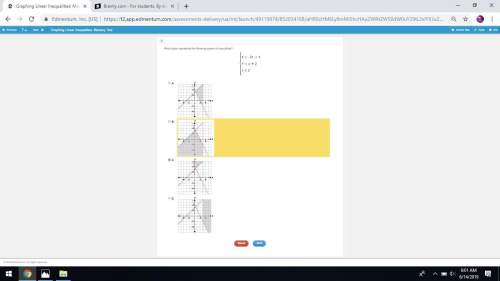
Mathematics, 19.07.2019 23:30 19sierraamber
Tia owns a fruit shop and is selling a fresh lot of apples and oranges. she wants the ratio of apples to oranges sold to be 4 to 2. tia wants to sell a total of 42 apples and oranges. how many apples should she sell?

Answers: 1


Other questions on the subject: Mathematics

Mathematics, 21.06.2019 13:50, tyleeonfleek36
Question and answers are in the attached picture. you so much in advance.
Answers: 3

Mathematics, 21.06.2019 20:10, morgantisch25
A. use the formula for continuous compounding with the original example: $1000 invested at 2% for 1 year. record the amount to 5 decimal places. use a calculator. b. compare it to the result using the original compound interest formula with n = 365 calculated to 5 decimal places. which has a larger value? explain.
Answers: 1

Mathematics, 21.06.2019 20:30, cogger9348
3.17 scores on stats final. below are final exam scores of 20 introductory statistics students. 1 2 3 4 5 6 7 8 9 10 11 12 13 14 15 16 17 18 19 20 57, 66, 69, 71, 72, 73, 74, 77, 78, 78, 79, 79, 81, 81, 82, 83, 83, 88, 89, 94 (a) the mean score is 77.7 points. with a standard deviation of 8.44 points. use this information to determine if the scores approximately follow the 68-95-99.7% rule. (b) do these data appear to follow a normal distribution? explain your reasoning using the graphs provided below.
Answers: 1

Mathematics, 21.06.2019 21:30, gonzalezashley152
In a test for esp (extrasensory perception), the experimenter looks at cards that are hidden from the subject. each card contains either a star, a circle, a wave, a cross or a square.(five shapes) as the experimenter looks at each of 20 cards in turn, the subject names the shape on the card. when the esp study described above discovers a subject whose performance appears to be better than guessing, the study continues at greater length. the experimenter looks at many cards bearing one of five shapes (star, square, circle, wave, and cross) in an order determined by random numbers. the subject cannot see the experimenter as he looks at each card in turn, in order to avoid any possible nonverbal clues. the answers of a subject who does not have esp should be independent observations, each with probability 1/5 of success. we record 1000 attempts. which of the following assumptions must be met in order to solve this problem? it's reasonable to assume normality 0.8(1000), 0.2(1000)%30 approximately normal 0.8(1000), 0.2(1000)% 10 approximately normal srs it is reasonable to assume the total number of cards is over 10,000 it is reasonable to assume the total number of cards is over 1000
Answers: 1
You know the right answer?
Tia owns a fruit shop and is selling a fresh lot of apples and oranges. she wants the ratio of apple...
Questions in other subjects:


History, 05.10.2020 23:01





Mathematics, 05.10.2020 23:01







